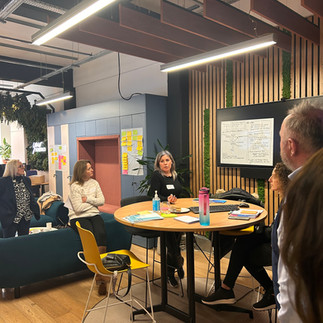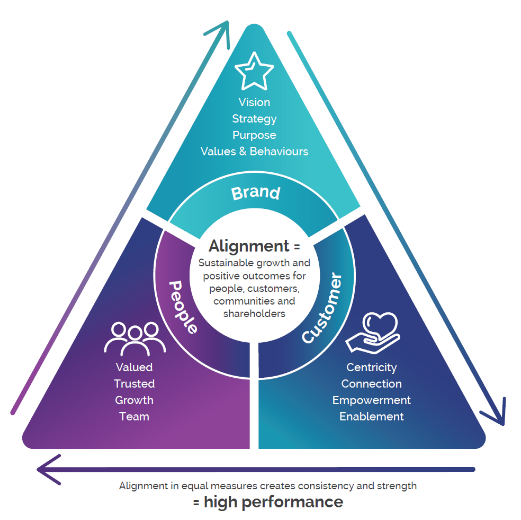Culture Hackathon: Reimagining Transformation and the People Experience
- dragonfish
- Mar 21, 2023
- 4 min read
Conceived and curated by Dragonfish
Delivered by Working Futures
Powered by People and Transformational HR
Hosted by Ascentae
Charities, consultancies, retailers, psychologists, designers, educationalists, corporate real estate, technologists, manufacturing and more were represented at the Dragonfish-convened hackathon in Central London this past Tuesday.
We explored the concept of culture and, particularly, its implications, power, challenges, and opportunities around business and work transformation and the People Experience of work.
After a brilliant scene set, we were framed by our bookends and chapters of transformation in work and the People Experience:

Readiness and realisation and the “shelf” of culture – that supports and enables the blueprint, a focus on talent, capabilities, enacting transformed states, value creation, and the case for a transformed way of working.
Our process – through pacy and creative thinking sprints – revealed some incredibly bold hacks.
Hack 1: Reclaiming Humanity
The call here was big and noble. That culture – impacting positively at work to create a world where people are fulfilled by their work and feel truly valued – is not the utopian ideal but a fundamental right. Impacting positively on ALL aspects of society is more achievable with balanced and esteem-building work.
At the heart of this hack was the unification of customer experience and people experience. Data, understanding, interventions, listening, responding, and supporting choice.
Leadership congruent with that was needed but with leaders' obsession with results, targets, and economic value being driven by customer demand, this could bring more favour to the impacts of a strong culture and people experience to that lens; adaptive and responsive.
Helping people with adaptability and “learnability” were crucial (not just technical) skills; a systemic move to a new function “Experience” that unified customer and colleague experience; creating safe playgrounds for continuous experimentation as singular transformation is usurped by constant, iterative change. Metrics, data, and anthropological drivers were needed as were hiring techniques for human characteristics.
Hack 2: Culture and People Experience in Start-Ups
Increasingly, the energy of new companies with new products and services gives hope of breakthrough solutions but culture and people experience need an earlier entry into the thinking beyond product, market, and funding. Outside-in, intentional, and evolving elements of culture and people experience are needed as start-ups scale, learn, and discover their place in the market.
Evidence of culture positivity and impact, investor scrutiny into culture and people experience in choosing to fund scalable enterprises, a people experience team created as early as possible alongside product, marketing and customer insight.
Culture happens anyway, so deliberate attention to the most productive, supportive, and enabling culture and people experience is more vital than perhaps many start-ups give credibility to. Start this way, grow this way, and sustain this way.
Hack 3: Culture is really an identity crisis
A bold hack declaring how culture has become a “dumping ground” for all manner of failings, challenges, and even successes without due care and appropriate consideration.
Especially for things that are “too hard”. Like human behaviours and the interrelationships between people in teams and in times of need and urgency.
Leadership self-awareness is key to this. And emotional intelligence to know this is key will need some prompting and acceptance but is vital.
Psychological Safety as a founding principle will enable us to position culture as an interrogatable and assuring presence; strengthened by increased focus from HR/People professionals on how to bring more data-led insight and use their capabilities more wisely in culture being a force for good.
So a reimagining of culture (really unpacked and uncovered) is necessary to drive change through the lived experience of people at all levels.
A richer understanding of all people; splitting senior roles to be a paired process of a technical expert and a people-focused partner to bring better balance; capability building that is sensitive to cultural impact; fewer surveys but much sharper insight; and a repositioning of the HR function as the Humanising Domain; were all seen as positive shifts to resolve the culture identity crisis and restore the power of a vibrant and binding culture.
And finally,
Hack 4: Intentional Human-Centred Leadership/Organisation
The hypothesis here is that connection and purpose drive sustainable growth, performance, and innovation.
Again, the call is for evolution and not just transformation. Cross-functional teams to build stronger connectivity and inclusivity; reframing mindsets over big initiatives; empowerment to mean truly human-powered; a series of seamless experiences; and a renewal of the concept of a Learning Organisation – built on agility, curiosity, and learning in the flow of work with reflection.
In order to develop this, intentional time needs setting as the “busyness” agenda is too dominant causing neglect to these possibilities. More intentional experiments that close the say/do gaps; more networked resource groups; that self-awareness raising again; tagging and exemplifying moments that matter; a new book to symbolise this urge; and momentum-building activities.

So, overall there’s a clear clarion call.
Humanised – Intentional, self-aware, and more human-centred leadership and design that puts culture and people experience at the heart and soul of everything any organisation does – whatever its products, service, or value proposition are.
Evolutionary – Experiments and the removal of transformation initiatives into constant evolutionary change that is purpose-led; co-created; responsive.
Sensitive – to people experience and customer experience as one related and distinct practice field.
Because if culture really is an identity crisis, the psychology of what it (culture) really is, needs resolving by a form of organisational therapeutic intervention before we can really start to build sustainable, flourishing enterprises for the good of people and our society.
We aren’t in a people experience. We are the people experience.
We’re not in a culture, we are the culture.
We’re not in an evolution. We are the evolution.
Co-Authors
Lynsey Austin, Dragonfish, Culture and Performance Consultancy & Perry Timms, Founder and Chief Energy Officer - PTHR (A Certified BCorp)











Comments